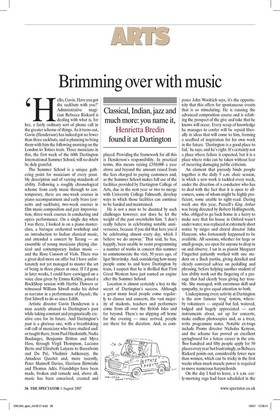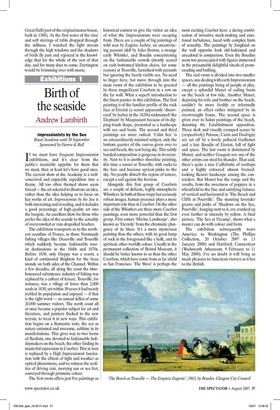Classical, Indian, jazz and much more: you name it
Classical, Indian, jazz and much more: you name it, Henrietta Bredin found it at Dartington Brimming over with music Hell°, Gavin. Have you got the sackbuts with you?'
Administrative magician Rebecca Rickard is dealing with what is, for her, a fairly ordinary sort of phone call in the greater scheme of things. As it turns out, Gavin (Henderson) has indeed got no fewer than three sackbuts, and is planning to bring them with him the following morning on the London to Totnes train. Three musicians in this, the first week of the 60th Dartington International Summer School, will no doubt be duly grateful.
The Summer School is a unique gathering point for musicians of every possible description and of varying standards of ability. Following a roughly chronological scheme from early music through to contemporary, there are one-week courses in piano accompaniment and early brass (cornetts and sackbuts), two-week courses in film music composition and jazz improvisation, three-week courses in conducting and opera performance. On a single day when I was there, I looked in on a piano masterclass, a baroque orchestral workshop and an introduction to Indian classical music, and attended a concert by Tarang — an ensemble of young musicians playing classical and contemporary Indian music — and the Rose Consort of Viols. There was a great deal more on offer but I have unfortunately not yet managed to master the art of being in three places at once. If I'd gone in later weeks, I could have earwigged on a voice class given by Emma Kirkby, joined a RockShop session with Herbie Flowers or witnessed William Sitwell make his debut as narrator in a performance of Façade, the first Sitwell to do so since Edith.
Artistic director Gavin Henderson is a man acutely attuned to Dartington's past while taking constant and pragmatically creative care for its future. And Dartington's past is a glorious one, with a breathtaking roll call of musicians who have studied and/ or taught there, from Paul Hindemith, Nadia Boulanger, Benjamin Britten and Myra Hess, through Virgil Thompson, Luciano Berio and Elizabeth Lutyens to Barenboim and Du Pre, Vladimir Ashkenazy, the Amadeus Quartet and, more recently, Peter Maxwell Davies, Harrison Birtwistle and Thomas Ades. Friendships have been made, broken and remade and, above all, music has been conceived, created and played. Providing the framework for all this is Henderson's responsibility. In practical terms, this means raising £350,000 a year above and beyond the amount raised from the fees charged to paying customers and, as the Summer School makes full use of the facilities provided by Dartington College of Arts, due in the next year or two to merge with University College Falmouth, develop ways in which those facilities can continue to be funded and maintained.
He is not a man to be daunted by such challenges however; nor does he let the weight of the past overwhelm him 'I don't really believe in celebrating notable anniversaries, because if you did that here you'd be celebrating almost every day, which I believe we do anyway.' That said, he has, happily, been unable to resist programming a number of works in concert this summer to commemorate the visit, 50 years ago, of Igor Stravinsky. And, considering how many people come to and leave Dartington by train, I suspect that he is thrilled that First Great Western have just named an engine after the Summer School.
Location is almost certainly a key to the secret of Dartington's success. Although a great many local people come regularly to classes and concerts, the vast majority of students, teachers and performers come from all over the British Isles and far beyond. There's no slipping off home for the evening — once arrived, people are there for the duration. And, as composer John Woolrich says, it's the opportunity that this offers for spontaneous events that is so stimulating. He is running the advanced composition course and is relishing the prospect of the give and take that he knows will occur. Every scrap of knowledge he manages to confer will be repaid liberally in ideas that will come to him, forming a seedbed of inspiration for his own work in the future. 'Darlington is a good place to fail,' he says, and he's right. It's certainly not a place where failure is expected, but it is a place where risks can be taken without fear of incurring damaging public criticism.
An element that joyously binds people together is the daily 9 a.m. choir session, in which a new work is tackled every week, under the direction of a conductor who has to deal with the fact that it is open to allcomers, some of whom might be highly proficient, some unable to sight-read. During week one this year, Purcell's King Arthur was being directed by Robert Hollingworth, who, obliged to go back home in a hurry to make sure that his house in Oxford wasn't underwater, was replaced at extremely short notice by singer and choral director John Hancorn, who fortunately happened to be available. All sessions, whether for large or small groups, are open for anyone to drop in on and observe. I sat in as pianist Margaret Fingerhut patiently worked with one student on a Bach partita, giving detailed and clearly conveyed advice on pedalling and phrasing, before helping another student of less ability work out the fingering of a passage that had clearly been giving her trouble. She managed, with enormous skill and sympathy, to give equal attention to both.
Underpinning every activity at Dartington is the now famous `trog' system, whereby volunteers — unpaid but fed, watered, lodged and hugely appreciated — cart instruments about, set up for concerts, make endless photocopies and, as a treat, write programme notes. Notable ex-trogs include Proms director Nicholas Kenyon, and the scheme has proved an excellent springboard for a future career in the arts. Two hundred and fifty people apply for 50 places every year but frustratingly, as Rebecca Rickard points out, considerably fewer men than women, which can be tricky in the first weeks when much muscle power is required to move numerous harpsichords.
On the day I had to leave, a 6 a.m. early-morning raga had been scheduled in the Great Hall (part of the original manor house, built in 1388). As the first notes of the sitar and soft stirrings of tabla dropped through the stillness, I watched the light stream through the high windows and the shadows of birds fly past and rejoiced in the knowledge that for the whole of the rest of that day, and for many days to come, Dartington would be brimming over with music.









































 Previous page
Previous page